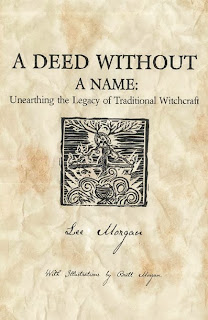Book Review: A Deed Without a Name
A Deed Without a Name: Unearthing the Legacy of Traditional Witchcraft by Lee Morgan
If you are interested in European traditional witchcraft (which is not the same as Wicca) this book is an excellent starting point. It bridges the gap between the scholarly study of Renaissance-era and earlier magical works and actual practice as it comes down to us through blurred and broken traditions. As author Lee Morgan writes,
Morgan addresses not only the better-known aspects of the Craft such as the Mark, fetches, hedge-riding, and ritual work but also the psychological and emotional implications of approaching the Powers in traditional fashion. This is not a voyage for the merely curious, a fact this book makes clear. Setting foot along the path of the Cunning Craft will change you deeply and irretrievably. But if you feel called, this volume is an excellent starting point. There is no fluff in it but real, practical information gleaned from time-honored texts, interviews with modern practitioners and the author’s personal experience.
As I read through the text, I was impressed with the way Morgan has brought the basics of the Craft into the modern day without losing the mystery and timelessness of the practice. I have heard the complaint that this book does too much of the ‘hard work’ novices are expected to attempt by themselves – digging through arcane texts, connecting the dots among obscure and obsolete practices – and I must disagree. The true hard work of the Craft comes in the journeying, the Work itself, the times when we meet the Mystery head-on and in person and are transformed. All Morgan does is organize the material in a sensible manner and provide stepping stones to set the reader on his or her way. He leaves the real work for us to do ourselves. His writing is both realistic and inspirational; I expect it will give many readers the push they need to move forward along this path.
Though I do recommend A Deed Without a Name, I must add my own disclaimer here: Reading a book does not make you a witch. Walking the Path every day of your life does. So yes, read the book – it’s wonderful and I’m sure you’ll refer back to it time and again. But do the Work as well. The serious student of witchcraft will also apply themselves to the Further Reading list at the end of the book in order to move deeper into the material and the experience. And of course, no book can substitute for the guidance of a good teacher.
I wish you well on your journeys.
If you are interested in European traditional witchcraft (which is not the same as Wicca) this book is an excellent starting point. It bridges the gap between the scholarly study of Renaissance-era and earlier magical works and actual practice as it comes down to us through blurred and broken traditions. As author Lee Morgan writes,
“To access what some people call the ‘tradition’ of witchcraft we need to first understand that witchcraft as we know it today is a myth. But this is not to say it doesn’t exist. The ‘nameless deed’ that lies behind that myth is part of the eternal nature of mankind. But it is also universally part of human nature to experience the divine and the transcendent through the conduit of myth.”
Morgan addresses not only the better-known aspects of the Craft such as the Mark, fetches, hedge-riding, and ritual work but also the psychological and emotional implications of approaching the Powers in traditional fashion. This is not a voyage for the merely curious, a fact this book makes clear. Setting foot along the path of the Cunning Craft will change you deeply and irretrievably. But if you feel called, this volume is an excellent starting point. There is no fluff in it but real, practical information gleaned from time-honored texts, interviews with modern practitioners and the author’s personal experience.
As I read through the text, I was impressed with the way Morgan has brought the basics of the Craft into the modern day without losing the mystery and timelessness of the practice. I have heard the complaint that this book does too much of the ‘hard work’ novices are expected to attempt by themselves – digging through arcane texts, connecting the dots among obscure and obsolete practices – and I must disagree. The true hard work of the Craft comes in the journeying, the Work itself, the times when we meet the Mystery head-on and in person and are transformed. All Morgan does is organize the material in a sensible manner and provide stepping stones to set the reader on his or her way. He leaves the real work for us to do ourselves. His writing is both realistic and inspirational; I expect it will give many readers the push they need to move forward along this path.
Though I do recommend A Deed Without a Name, I must add my own disclaimer here: Reading a book does not make you a witch. Walking the Path every day of your life does. So yes, read the book – it’s wonderful and I’m sure you’ll refer back to it time and again. But do the Work as well. The serious student of witchcraft will also apply themselves to the Further Reading list at the end of the book in order to move deeper into the material and the experience. And of course, no book can substitute for the guidance of a good teacher.
I wish you well on your journeys.


Comments
Post a Comment